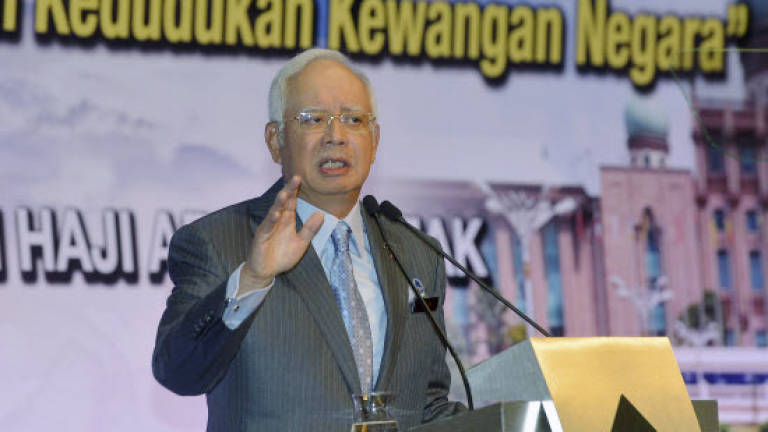Highlights of PM's special address on the economy

KUALA LUMPUR: Following are the highlights of the special address by Prime Minister and Finance Minister Datuk Seri Najib Abdul Razak on current developments and the government's financial position at the Putrajaya International Convention Centre (PICC) today:
* Malaysia's GDP will grow by between 4.5 – 5.5% in 2015.
* The current account will remain in surplus in 2015.
* The ringgit exchange rate will over time adjust to reflect Malaysia's strong fundamentals.
* Malaysia's fiscal deficit target would be revised to 3.2% of GDP in 2015 – higher than the 3% set out in the Budget, but lower than the 3.5% in 2014, and in line with the government's continuing commitment to fiscal consolidation.
* Development expenditure for 2015 would be fully maintained but operating expenditure is expected to be reduced by RM5.5 billion.
* The government will take specific and proactive measures to align the economy with the recent global economic developments.
* The recent reduction in pump prices of petrol and diesel by 35 sen and 30 sen per litre, respectively, will increase the overall disposable income of consumers by RM7.5 billion.
* Government has revised downwards its forecast for the average baseline oil price to US$55 per barrel for 2015.
* At the forecast price of US$55 per barrel, there will be a revenue shortfall of RM13.8 billion.
* Despite the savings of RM10.7 billion from the implementation of the managed float mechanism for retail fuel prices, the government still faces a revenue shortfall of RM8.3 billion to accommodate the 2015 Budget measures.
* Taking into account the revised estimates, the government is revising the fiscal deficit target to 3.2% of GDP in 2015.
* The government will not compromise on national development planning as it will enhance productive capacity of the economy.
* The government will not neglect the people's welfare, particularly the bottom 40% of households.
* The fluctuations in the ringgit are influenced by developments in the global economy. Hence, the ringgit is not the only currency to have weakened against the US dollar.
* The government must ensure that the current account in the balance of payments must remain in surplus.
* The government must continue with fiscal reforms and consolidation.
* The government must ensure that economic activity must be further diversified to enable the country to cope with falling crude oil and commodity prices.
* The government is confident that the exchange rate will over time adjust to reflect the strong economic fundamentals. Of importance, our financial system continues to function in an orderly manner.
* Most importantly, there has been no disruption to financial intermediation, with lending activities continuing smoothly.
* Businesses continue to have access to financing from banking institutions and the capital market.
* Greater policy flexibility, adequate international reserves, deeper and more diversified financial markets, sound banking system and strong domestic institutional investors such as the Employees Provident Fund will increase resilience to volatile capital flows.
* Malaysia is a crude oil exporter. Thus, when oil prices plummeted recently, there was a perception that export receipts will also decline drastically and result in a current account deficit. Indeed, this perception is not correct.
* As a net crude oil exporter, Malaysia had a surplus of RM7.7 billion from January to November 2014.
* Malaysia is an importer of petroleum products with a net import bill of RM8.9 billion during the same period.
* The perception that Malaysia is a large oil producer is also not true.
* With a better outlook for the global economy in 2015, the shortfall in commodity receipts is expected to be cushioned by increased demand for manufactured goods, such as electrical and electronic products, wood-based products, textile products and others, which account for 76% of total exports.
* Malaysia is confident of achieving GDP growth in the range of 4.5 to 5.5% this year.
* The government will ensure balanced, inclusive and sustainable economic growth.
* The government will provide assistance to the people and business community to rebuild infrastructure damaged by floods.
* The government will actively promote import-substitution services such as shipping, port, education and professional services. This will reduce dependence on foreign sources for procurement of goods and services.
For businesses affected by the floods, the government will:
* Provide an additional RM100 million to TEKUN and RM100 million to AIM to provide soft loans to support SMEs and microenterprises.
* BSN, Agrobank, SME Bank, TEKUN and AIM will defer existing loan repayments of up to six months;
* Bank Negara Malaysia will establish a RM500 million Special Relief Facility for SME loan financing at a concessionary rate of 2.25% with a grace period of up to six months through banking and development financial institutions;
* Bank Rakyat will offer a personal loan scheme of up to RM50,000 at a financing rate as low as 3.9% while loan repayments will start after six months from loan disbursement;
* A sum of RM500 million will be provided by financial institutions with a 70% guarantee under a Flood Relief Loan Guarantee Scheme;
* SMEs in the flood affected areas will be exempted from levy payment to the Human Resources Development Fund (HRDF) for a period of six months with effect from Feb 1, 2015. – Bernama